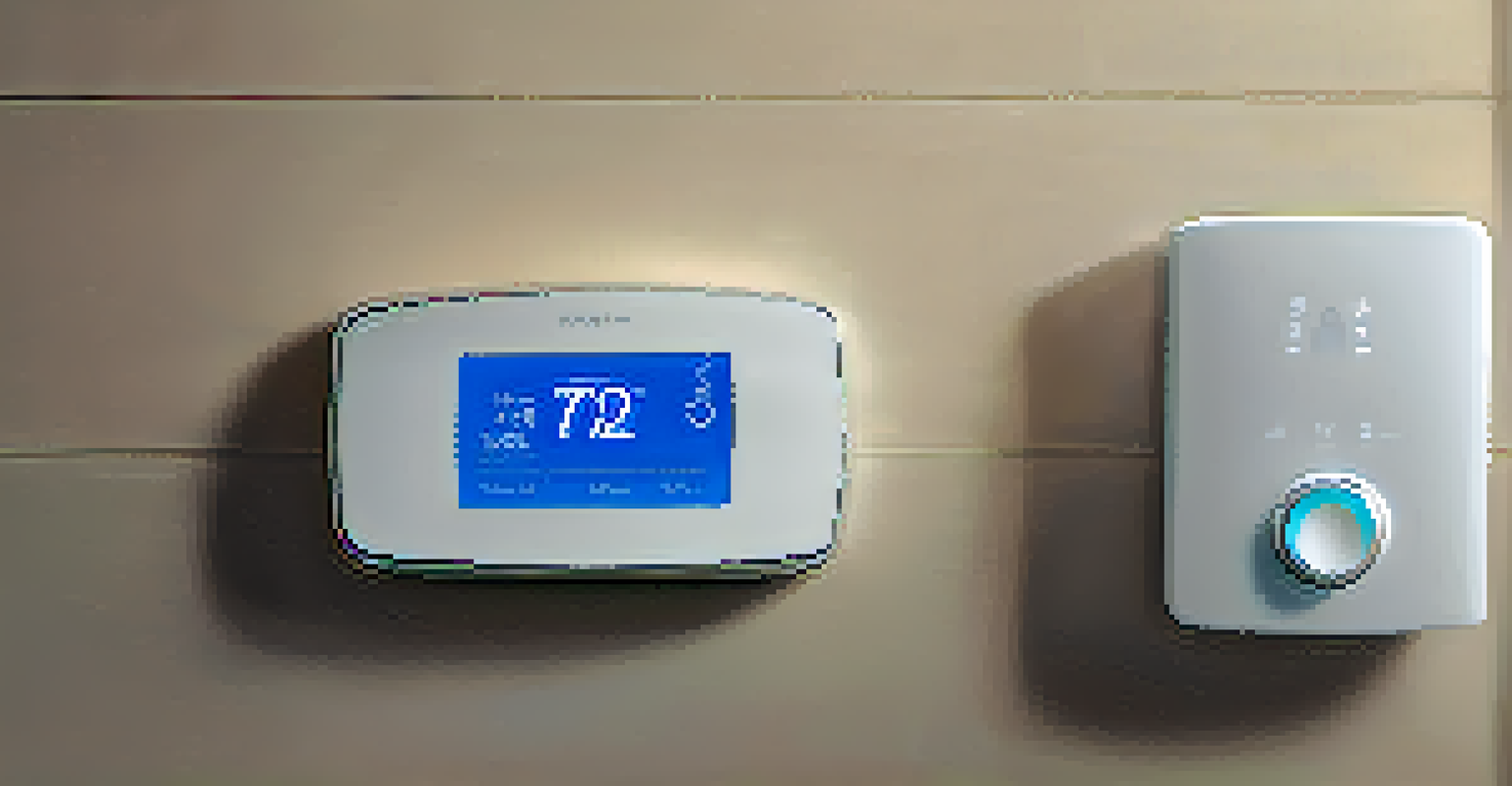Home Energy Management: Automation Techniques for Savings

Understanding Home Energy Management Systems
Home Energy Management Systems (HEMS) are designed to monitor and manage energy use within your home. These systems help you understand where your energy is being consumed and identify areas for potential savings. By integrating smart devices and appliances, HEMS can provide insights that empower homeowners to make informed decisions.
Energy efficiency is not a destination, but a journey that requires ongoing commitment and engagement.
Imagine having a personal energy coach that tracks your habits and suggests improvements. That's essentially what HEMS does; it learns your usage patterns and can even recommend optimal times to run devices based on energy rates. This not only helps in reducing costs but also contributes to a more sustainable lifestyle.
As energy prices fluctuate, having a HEMS in place allows you to adapt quickly. With real-time data at your fingertips, you can adjust your energy consumption habits to take advantage of lower rates, ultimately leading to significant savings on your utility bills.
The Role of Smart Appliances in Energy Savings
Smart appliances are a cornerstone of home energy management. These devices, like smart thermostats, refrigerators, and washing machines, can be programmed to operate during off-peak hours, when energy costs are typically lower. This not only saves you money but also helps to balance overall energy demand on the grid.

Consider a smart thermostat that learns your schedule and adjusts the heating or cooling accordingly. If you’re not home, it can lower the temperature or raise it, ensuring that energy isn’t wasted. This kind of automation makes your home more efficient and allows you to focus on what really matters—living your life.
HEMS Optimize Energy Usage
Home Energy Management Systems (HEMS) help homeowners monitor and manage energy consumption, leading to informed decisions and potential savings.
The convenience of controlling these appliances through your smartphone or voice commands adds another layer of ease. You can start a load of laundry on the way home or preheat the oven for dinner via an app, making your routine smoother and more energy-efficient.
Benefits of Energy Monitoring Devices
Energy monitoring devices are essential tools in a home energy management system. These devices track real-time energy consumption, providing valuable insights into your usage patterns. By analyzing this data, homeowners can identify energy hogs and make necessary adjustments to cut costs.
The future is green energy, sustainability, renewable energy.
For instance, if your monitoring device shows that a particular appliance uses more energy than expected, you might consider replacing it with a more efficient model. Over time, these small changes can lead to substantial savings on your energy bills, making monitoring a worthwhile investment.
Additionally, many monitoring devices offer alerts or notifications when energy consumption spikes. This proactive approach allows you to take immediate action, potentially preventing high bills and encouraging more mindful energy use.
Automating Your Home's Lighting for Efficiency
Automating your home’s lighting is a simple yet effective way to enhance energy efficiency. Using smart bulbs and lighting systems, you can schedule lights to turn off during the day or dim them when natural light is sufficient. This not only saves energy but also prolongs the life of your bulbs.
Imagine walking into a dark room and having your lights automatically turn on as you enter. Smart lighting systems can be programmed with motion sensors, ensuring lights are only on when needed. This feature not only reduces waste but also adds an extra layer of convenience to your daily life.
Smart Appliances Boost Efficiency
Smart appliances, like thermostats and washing machines, can be programmed to operate during off-peak hours, saving money and reducing energy demand.
Creating 'scenes' or settings for different times of day—like bright lights for morning routines and soft lighting for evenings—can also enhance your home environment. This customization not only improves your comfort but also contributes to energy savings by ensuring lights are used only when necessary.
Integrating Solar Power with Home Automation
Integrating solar power into your home energy management system can yield significant savings. Solar panels generate electricity from sunlight, which can be used to power your home, reducing reliance on traditional energy sources. When combined with automation, this setup becomes even more effective.
For example, smart energy management systems can optimize the use of solar energy by directing it to high-demand appliances during peak sunlight hours. This ensures you're using free energy whenever possible, minimizing costs and maximizing efficiency.
Beyond immediate savings, investing in solar power can increase your home's value and contribute to environmental sustainability. With automation, you can monitor your solar energy production and consumption, allowing you to make adjustments that further enhance your energy savings.
The Importance of HVAC Automation
Heating, ventilation, and air conditioning (HVAC) systems are major contributors to home energy consumption. Automating these systems can lead to significant savings on heating and cooling costs. Smart thermostats, for instance, can adjust the temperature based on your preferences and schedule, ensuring energy isn’t wasted.
Consider a scenario where your HVAC system learns that you leave for work at 8 AM and returns at 5 PM. It can automatically adjust the temperature to save energy while you're away and resume comfort levels just before you arrive home. This kind of automation not only enhances comfort but also significantly reduces energy bills.
Automation Enhances Comfort
Automating systems like HVAC and lighting not only improves energy efficiency but also ensures comfort and convenience in daily life.
Moreover, HVAC automation can include regular maintenance reminders and alerts for air filter changes. By ensuring your system runs efficiently, you can avoid costly repairs down the line and maintain optimal energy use throughout the year.
Setting Up a Smart Home Hub for Coordination
A smart home hub serves as the central command for all your connected devices. By integrating various smart appliances, lighting, and monitoring systems, you can create a streamlined approach to home energy management. This coordination enhances efficiency and makes managing your home simpler.
Imagine being able to control your entire home’s energy consumption from a single app. A smart home hub allows you to set schedules, create routines, and monitor usage in real time. This ease of access means you’re more likely to engage in energy-saving habits.

Additionally, many smart home hubs can be programmed to interact with each other. For instance, when you leave home, your hub can automatically turn off lights, adjust the thermostat, and even notify you if any appliances are left on. This level of automation not only saves energy but also provides peace of mind.